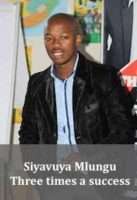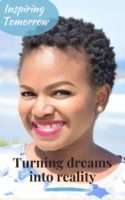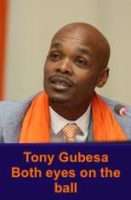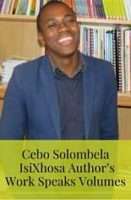Failing a grade is the last thing you would write on your wish list – that’s if you would include it at all! And if failing a grade once is not painful enough, our interviewee this week had to repeat Grade 11 three times.
Siyavuya Mlungu (25) is a hardworking, dedicated, self-disciplined and multi-skilled young man from Khayelitsha, Cape Town.
First, he’s a Director at Iyeza Express. This is an innovative bicycle courier company that focuses on collecting chronic medication from public clinics and delivering it to patients’ doorsteps. Second, he is Managing Director of Growth Business Coaching, which offers advice to small businesses. And third, he is an Associate Business Speaker at Thembinkosi Matika & Associates.
His businesses may be well established now, but like many South Africans, Siyavuya fought through tough challenges in the early stages of his life
“There were eight of us under a two-roomed shack. We relied on one bed that could accommodate five people only, therefore the remaining three would crash on the floor.” He adds that often rain would soak the entire floor so much that he literally slept while standing on his feet.
Siyavuya, whose name loosely translates to ‘We are happy’, says there was a point when his parents were not so ‘happy’ about him.
“At thirteen I was already smoking dagga, I then smoked tik at fourteen. I joined gangsterism when I was doing Grade 11 in 2006.”
A gangster’s life is a short-lived one, and soon his enemies were longing for his blood. “It was impossible to attend classes because our enemies would hide out with weapons – hell would break loose!” Siyavuya thus quickly learned that gangsterism doesn’t just strip off your freedom, it destroys your future as well.
“I then failed in 2006. Our rivals made our lives such a living hell that I had to drop out in 2007.” Bored, he hung around and smoked every bit of money that came in his direction.
He says March 2008 was the turning point of his life. He thought introspectively and made a serious vow to himself.
“I woke up one day and told my mother that I wanted to relocate to the Eastern Cape. I had to leave that Khayelitsha environment and start on a new, clean slate.”
He says the only thing he had at that stage was hunger for education; he had even been reduced to wearing his granny’s undersized Tommy shoes.
“I got rejected at my new school because I had no school uniform. [Plus] the first quarter was coming to an end and my grades were terrible,” he admits.
Eventually, he was accepted. His English teacher took him under her wing and bought him a full school uniform. He fulfilled his promise: he came top of his class in 2008, and secured himself a bursary for 2009.
“I became the head of the Debating Society in our school. We travelled throughout the EC. And I got the Best Student Award in 2009.”
He then enrolled for a Social Work Diploma in the Nelson Mandela Metropolitan University (NMMU). However his nightmares were far from being over.
“I passed my first year but circumstances forced me to abandon my studies in 2011. Life was tough and I couldn’t take it anymore.” He explained that his bursary covered tuition fees only; for accommodation and transport he dug deep into his own pocket.
“I had no family there and my family could not send me money ‘cos only my grandma was working. Having no mentor, nor a coach also affected me,” says Siyavuya.
Another reason he quit was that Social Work studies were not his passion. “The youth must follow their hearts, not what other people want. The journey gets tough but it’s much easier to hang on when you’re doing what you love.”
He left the Eastern Cape in 2011 and headed for Johannesburg where he completed a Diploma in Call Centre Services. He was only twenty-one but employers soon promised to give him a raise. “I was earning thousands already; life was great.”
His wallet may have finally received the money that it had been yearning for, but his soul wasn’t getting the satisfaction it desired. In 2012 he returned to Cape Town to further his studies. He knew that all he now wanted was to stand before people and teach them.
“So I enrolled at the University of the Western Cape (UWC). I was registered for Social Work – again!” He says that he wasn’t accepted for his first choice which was Theology, and Social Work once again just didn’t speak to him.
“Although my desire was to serve the people, Social Work had way too many limitations.” He says it allows you to serve but only under certain conditions and he didn’t want that.
Eventually he met a founder of Iyeza Express in 2013 and, as they say, the rest is history. “I started attending business workshops, doing public speaking. I finally had found my passion.”
He then cemented his formal knowledge and skills by completing a business course at the University of Stellenbosch Business School.
He says Iyeza Express has benefited from having media coverage via programmes such as e.tv’s Kaelo Stories of Hope, SABC’s Lehlo La Sechaba and Siyanqoba Beat it.
Just like any successful person, Siyavuya also has people that guide him in the right direction, to ensure he grows steadily. “My wife plays a huge role in my life. She’d call after a meeting and ask how it went. My son is also the reason I wake up in the morning and change the world he’ll live in.” Plus he didn’t fail to mention his mother who has been a role model to him, and who concerns herself about the success of his business.
“Thembinkosi Matika has also played a huge role in my life. He’s been a good mentor and friend. I always emphasize the importance of having a coach that guides you. I elaborate more on this in my book.” (Thembinkosi was profiled here – Hustle Upgrade. Apart from business mentoring, he works with hip hop and started Amanhlane Farmers and Multipurpose Cooperative.)
Author too? Yes, Siyavuya is currently both writing an autobiography titled A Boy From A Shack, and another that offers coaching to smaller businesses. FunDza believes that, “reading books and stories influence one’s choices, it gives value to lives, it enhances critical and creative thinking and encourages personal development”. Siyavuya is of the same view, saying young people should read more.
“It develops your vocabulary. It gives you the information that will progress you into another level. You’re also able to look at life through the eyes of other individuals.”
He says that his early suffering in life was a blessing in disguise: “It taught me why I should never be poor again. Poverty destroys your dignity and I will never go back there.”
Siyavuya may have repeated Grade 11 three times and been involved in gangsterism but this favoured quote of his pretty much summarizes the life lessons experiences such as these taught:
“People do not fail, it’s the approach they use that fails.”©Siyavuya Mlungu







